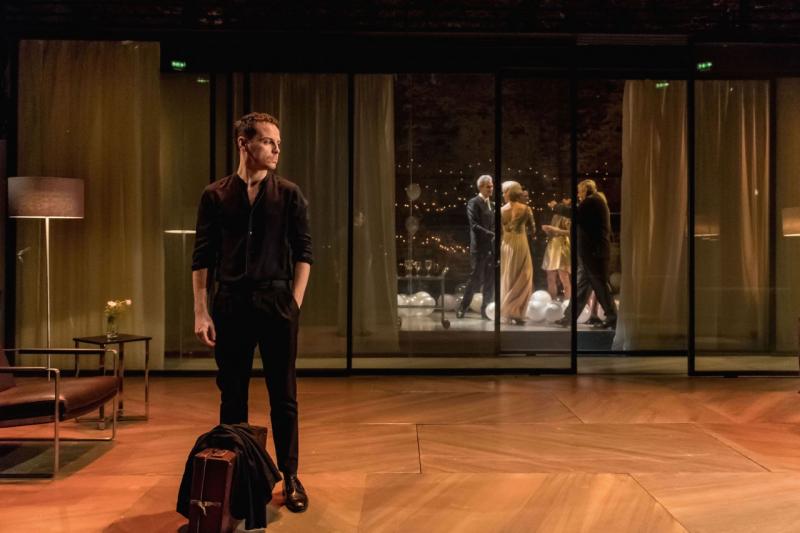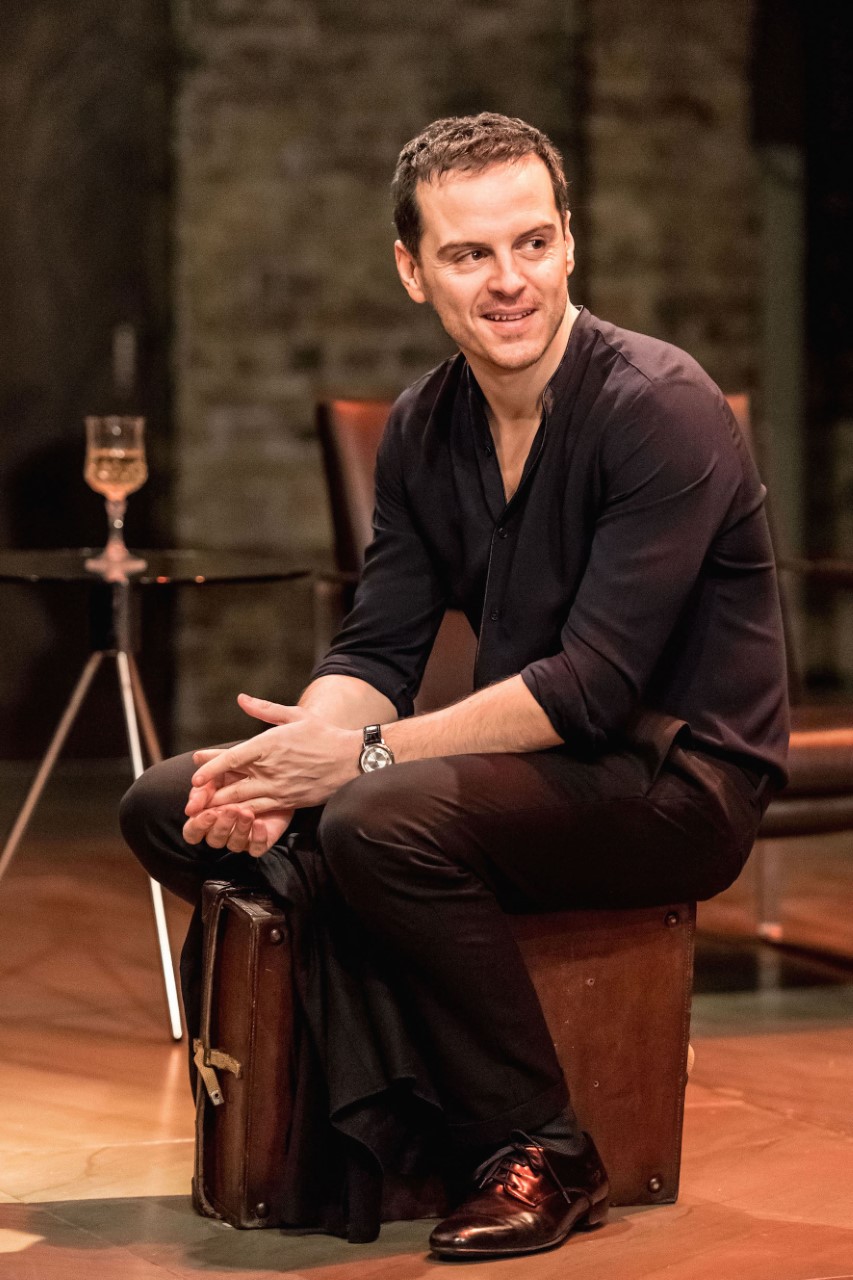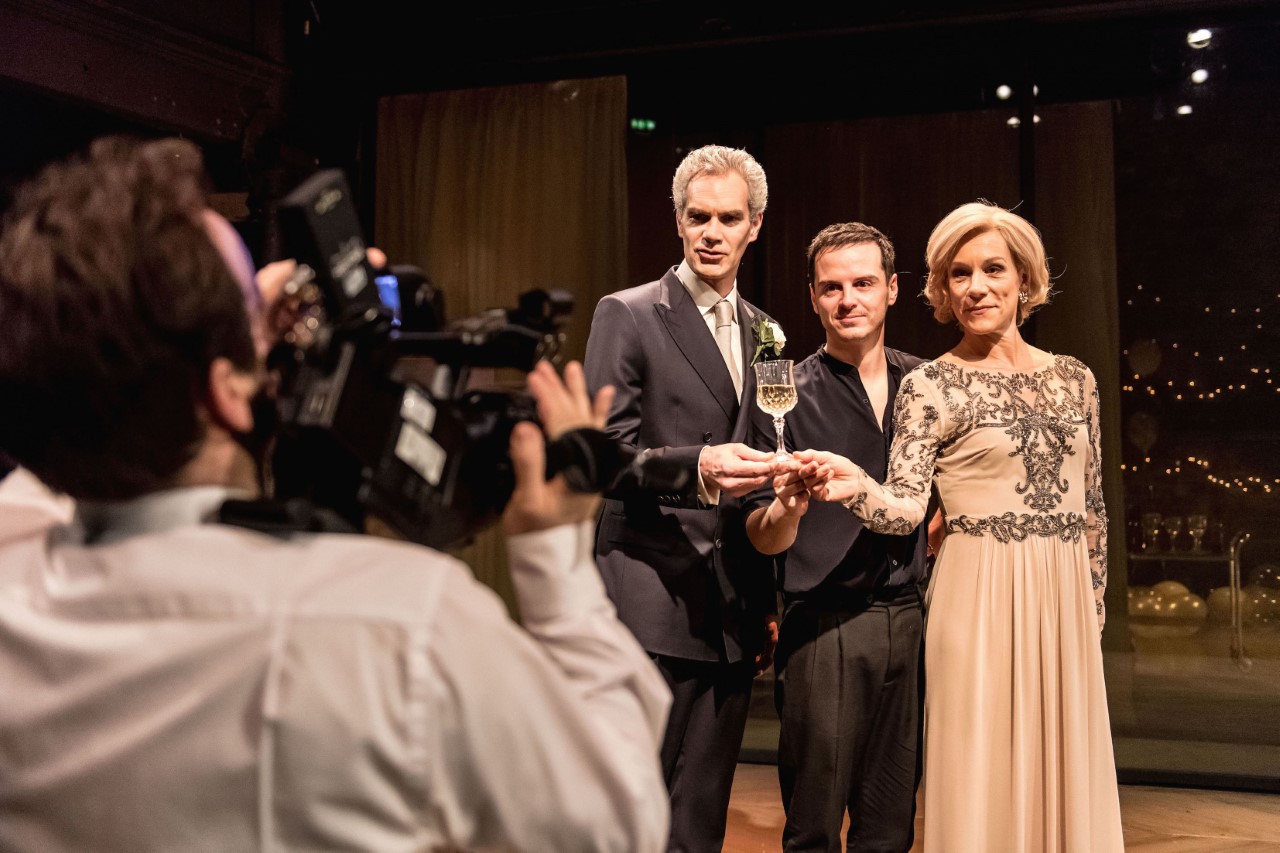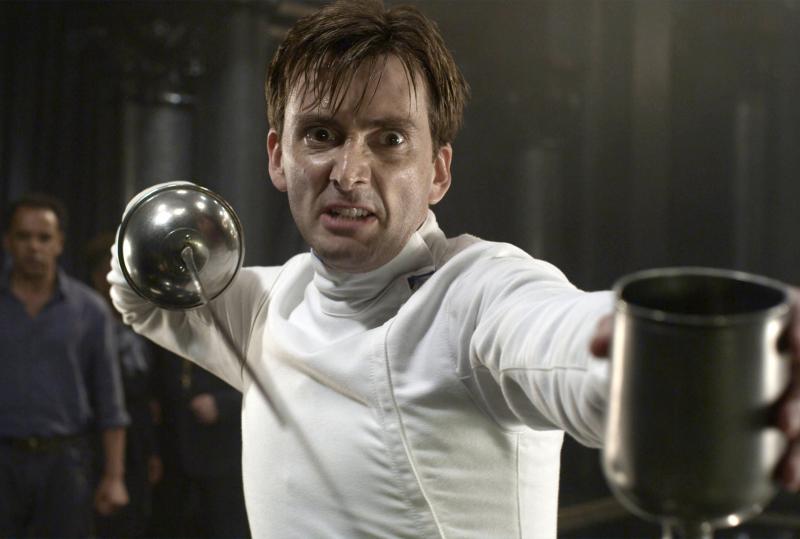Hamlet, Harold Pinter Theatre review - dislocatingly fresh makeover | reviews, news & interviews
Hamlet, Harold Pinter Theatre review - dislocatingly fresh makeover
Hamlet, Harold Pinter Theatre review - dislocatingly fresh makeover
Robert Icke finds new truths in old words in this captivating production starring Andrew Scott

Midway through Hamlet a troupe of actors arrives at Elsinore. Coaching them for his own ends, the prince turns director, delivering an impassioned critique: “O! it offends me to the soul to hear a robustious, periwig-pated fellow tear a passion to tatters…it out-herods Herod: I pray you avoid it.” It’s a philosophy director Robert Icke takes as his own watchword. Out goes declaiming, along with anything demonstrative or self-consciously dramatic, and in its place we get a conversational Hamlet that allows its audience to eavesdrop, forces us to turn voyeur in a contemporary palace of CCTV cameras and hidden microphones.
The effect is brilliantly, dislocatingly fresh. There was a risk that, once freed from the Almeida’s claustrophobic interior into the West End, Icke’s production might lose its uncomfortable intimacy, but instead it merely gains scope in the new contrast between Hildegard Bechtler’s sleek fishbowl of a palace (all sliding doors, hotel lobby-style sofas and chrome accessories) and the wider world that constantly breaks in on television screens that cover the walls. The rot at the heart of the Danish state stinks all the riper for being framed so tastefully – muted visual understatement only broken up by primary coloured flashes of the national flag.
Andrew Scott’s Hamlet who carves such clarity of thought through his soliloquies
But Icke’s updating only starts with design. It’s Shakespeare’s text that gets the biggest makeover in a feat that, whatever your views on the production as a whole, is remarkable for its unerring instincts. This is Shakespeare at length – largely uncut, supplementing the Folio with the Quartos where needed. This isn’t about updating detail or reference (the Emma Rice trick over at the Globe – cut-and-paste contemporary Shakespeare), it’s about finding new inflection in old words, revealing truths that were always there, guiding eye and ear to find new routes through a familiar landscape.
 Icke is helped by Andrew Scott’s Hamlet (pictured right) who carves such clarity of thought through his soliloquies, invites us so completely into his play of logic and morality. This Hamlet is no vacillating bore, but a live-wire wit – dry and wryly, self-mockingly funny, puncturing the balloon of his own inflated passions ("Why, what an ass am I?”) long before anyone else can do it. His nervous energy drives the production forwards in erratic bursts of intention, ricocheting off encounters with David Rintoul’s charismatic Ghost/Player King, Peter Wight’s Polonius (a heart-tugging portrait of mental decay) and a tellingly gender-bent Guildenstern (Madeline Appiah).
Icke is helped by Andrew Scott’s Hamlet (pictured right) who carves such clarity of thought through his soliloquies, invites us so completely into his play of logic and morality. This Hamlet is no vacillating bore, but a live-wire wit – dry and wryly, self-mockingly funny, puncturing the balloon of his own inflated passions ("Why, what an ass am I?”) long before anyone else can do it. His nervous energy drives the production forwards in erratic bursts of intention, ricocheting off encounters with David Rintoul’s charismatic Ghost/Player King, Peter Wight’s Polonius (a heart-tugging portrait of mental decay) and a tellingly gender-bent Guildenstern (Madeline Appiah).
There are moments of magic: the live-streamed performance of The Mousetrap, video screens projecting the reactions of a court who take their seats in the front row of the theatre itself; the initial encounter with the Ghost – genuinely terrifying; the sexual charge between Angus Wright’s Claudius and Juliet Stevenson’s Gertrude. But there are also some issues.
The dumbshow (scored to a Bob Dylan soundtrack) looks like nothing so much as a Building Society advertisement. Would Claudius really confess his sins to Hamlet (and would he, hearing them, really not shoot him on the spot?); would a modern-day Ophelia really accept so much, so quietly from her lover as Jessica Brown Findlay uncomplainingly does? Both she and Stevenson struggle to find their place in this updating, and Icke’s insertion of a dubious Quarto scene between Gertrude (Juliet Stevenson, pictured below with Wight and Scott) and Horatio suggests a recognition (if not a satisfactory solution) of the problem.
 Running at nearly four hours (with an unnecessary second interval breaking the play’s stride just as it should be speeding up), this Hamlet earns every minute of its stage time. Far from a foregone conclusion, the ending reads newly charged as Laertes, softened by Hamlet’s sincerity, has a last-minute change of heart. For one wonderful moment we believe everything could yet be alright, that this will be the bout that ends in a handshake and not a body-count. Those bodies, when they finally come, weigh heavy indeed.
Running at nearly four hours (with an unnecessary second interval breaking the play’s stride just as it should be speeding up), this Hamlet earns every minute of its stage time. Far from a foregone conclusion, the ending reads newly charged as Laertes, softened by Hamlet’s sincerity, has a last-minute change of heart. For one wonderful moment we believe everything could yet be alright, that this will be the bout that ends in a handshake and not a body-count. Those bodies, when they finally come, weigh heavy indeed.
- Hamlet is at the Harold Pinter theatre until 2 September, 2017
- Read more theatre reviews on theartsdesk
Andrius Mamontovas, Globe to Globe. Lithuanian take on the Danish play puts on a frantic disposition
Benedict Cumberbatch, Barbican. Visuals threaten to swamp Shakespeare – and, yes, Sherlock
 David Tennant, RSC/BBC. Star looks for life in an infinite space beyond the Tardis
David Tennant, RSC/BBC. Star looks for life in an infinite space beyond the Tardis
Lars Eidinger, Schaubühne Berlin. Acrobatic Hamlet, outshone by the earth and the rain
Maxine Peake, Royal Exchange, Manchester. An underwhelming production, but Peake is gripping as the young Prince
Michael Sheen, Young Vic. Sheen is riveting as the crazed Danish Prince in Ian Rickson's terrifying psychiatric-hospital staging
Rory Kinnear, National Theatre. Kinnear isn’t a romantic Prince, but an unsettled, battling one in Nicholas Hytner's staging which is modern, militaristic and unfussy
Overleaf: Robert Icke's dazzling career so far
Midway through Hamlet a troupe of actors arrives at Elsinore. Coaching them for his own ends, the prince turns director, delivering an impassioned critique: “O! it offends me to the soul to hear a robustious, periwig-pated fellow tear a passion to tatters…it out-herods Herod: I pray you avoid it.” It’s a philosophy director Robert Icke takes as his own watchword. Out goes declaiming, along with anything demonstrative or self-consciously dramatic, and in its place we get a conversational Hamlet that allows its audience to eavesdrop, forces us to turn voyeur in a contemporary palace of CCTV cameras and hidden microphones.
The effect is brilliantly, dislocatingly fresh. There was a risk that, once freed from the Almeida’s claustrophobic interior into the West End, Icke’s production might lose its uncomfortable intimacy, but instead it merely gains scope in the new contrast between Hildegard Bechtler’s sleek fishbowl of a palace (all sliding doors, hotel lobby-style sofas and chrome accessories) and the wider world that constantly breaks in on television screens that cover the walls. The rot at the heart of the Danish state stinks all the riper for being framed so tastefully – muted visual understatement only broken up by primary coloured flashes of the national flag.
Andrew Scott’s Hamlet who carves such clarity of thought through his soliloquies
But Icke’s updating only starts with design. It’s Shakespeare’s text that gets the biggest makeover in a feat that, whatever your views on the production as a whole, is remarkable for its unerring instincts. This is Shakespeare at length – largely uncut, supplementing the Folio with the Quartos where needed. This isn’t about updating detail or reference (the Emma Rice trick over at the Globe – cut-and-paste contemporary Shakespeare), it’s about finding new inflection in old words, revealing truths that were always there, guiding eye and ear to find new routes through a familiar landscape.
 Icke is helped by Andrew Scott’s Hamlet (pictured right) who carves such clarity of thought through his soliloquies, invites us so completely into his play of logic and morality. This Hamlet is no vacillating bore, but a live-wire wit – dry and wryly, self-mockingly funny, puncturing the balloon of his own inflated passions ("Why, what an ass am I?”) long before anyone else can do it. His nervous energy drives the production forwards in erratic bursts of intention, ricocheting off encounters with David Rintoul’s charismatic Ghost/Player King, Peter Wight’s Polonius (a heart-tugging portrait of mental decay) and a tellingly gender-bent Guildenstern (Madeline Appiah).
Icke is helped by Andrew Scott’s Hamlet (pictured right) who carves such clarity of thought through his soliloquies, invites us so completely into his play of logic and morality. This Hamlet is no vacillating bore, but a live-wire wit – dry and wryly, self-mockingly funny, puncturing the balloon of his own inflated passions ("Why, what an ass am I?”) long before anyone else can do it. His nervous energy drives the production forwards in erratic bursts of intention, ricocheting off encounters with David Rintoul’s charismatic Ghost/Player King, Peter Wight’s Polonius (a heart-tugging portrait of mental decay) and a tellingly gender-bent Guildenstern (Madeline Appiah).
There are moments of magic: the live-streamed performance of The Mousetrap, video screens projecting the reactions of a court who take their seats in the front row of the theatre itself; the initial encounter with the Ghost – genuinely terrifying; the sexual charge between Angus Wright’s Claudius and Juliet Stevenson’s Gertrude. But there are also some issues.
The dumbshow (scored to a Bob Dylan soundtrack) looks like nothing so much as a Building Society advertisement. Would Claudius really confess his sins to Hamlet (and would he, hearing them, really not shoot him on the spot?); would a modern-day Ophelia really accept so much, so quietly from her lover as Jessica Brown Findlay uncomplainingly does? Both she and Stevenson struggle to find their place in this updating, and Icke’s insertion of a dubious Quarto scene between Gertrude (Juliet Stevenson, pictured below with Wight and Scott) and Horatio suggests a recognition (if not a satisfactory solution) of the problem.
 Running at nearly four hours (with an unnecessary second interval breaking the play’s stride just as it should be speeding up), this Hamlet earns every minute of its stage time. Far from a foregone conclusion, the ending reads newly charged as Laertes, softened by Hamlet’s sincerity, has a last-minute change of heart. For one wonderful moment we believe everything could yet be alright, that this will be the bout that ends in a handshake and not a body-count. Those bodies, when they finally come, weigh heavy indeed.
Running at nearly four hours (with an unnecessary second interval breaking the play’s stride just as it should be speeding up), this Hamlet earns every minute of its stage time. Far from a foregone conclusion, the ending reads newly charged as Laertes, softened by Hamlet’s sincerity, has a last-minute change of heart. For one wonderful moment we believe everything could yet be alright, that this will be the bout that ends in a handshake and not a body-count. Those bodies, when they finally come, weigh heavy indeed.
- Hamlet is at the Harold Pinter theatre until 2 September, 2017
- Read more theatre reviews on theartsdesk
Andrius Mamontovas, Globe to Globe. Lithuanian take on the Danish play puts on a frantic disposition
Benedict Cumberbatch, Barbican. Visuals threaten to swamp Shakespeare – and, yes, Sherlock
 David Tennant, RSC/BBC. Star looks for life in an infinite space beyond the Tardis
David Tennant, RSC/BBC. Star looks for life in an infinite space beyond the Tardis
Lars Eidinger, Schaubühne Berlin. Acrobatic Hamlet, outshone by the earth and the rain
Maxine Peake, Royal Exchange, Manchester. An underwhelming production, but Peake is gripping as the young Prince
Michael Sheen, Young Vic. Sheen is riveting as the crazed Danish Prince in Ian Rickson's terrifying psychiatric-hospital staging
Rory Kinnear, National Theatre. Kinnear isn’t a romantic Prince, but an unsettled, battling one in Nicholas Hytner's staging which is modern, militaristic and unfussy
Overleaf: Robert Icke's dazzling career so far
The future of Arts Journalism
You can stop theartsdesk.com closing!
We urgently need financing to survive. Our fundraising drive has thus far raised £49,000 but we need to reach £100,000 or we will be forced to close. Please contribute here: https://gofund.me/c3f6033d
And if you can forward this information to anyone who might assist, we’d be grateful.

Subscribe to theartsdesk.com
Thank you for continuing to read our work on theartsdesk.com. For unlimited access to every article in its entirety, including our archive of more than 15,000 pieces, we're asking for £5 per month or £40 per year. We feel it's a very good deal, and hope you do too.
To take a subscription now simply click here.
And if you're looking for that extra gift for a friend or family member, why not treat them to a theartsdesk.com gift subscription?
more Theatre
 Wendy & Peter Pan, Barbican Theatre review - mixed bag of panto and comic play, turned up to 11
The RSC adaptation is aimed at children, though all will thrill to its spectacle
Wendy & Peter Pan, Barbican Theatre review - mixed bag of panto and comic play, turned up to 11
The RSC adaptation is aimed at children, though all will thrill to its spectacle
 Hedda, Orange Tree Theatre review - a monument reimagined, perhaps even improved
Scandinavian masterpiece transplanted into a London reeling from the ravages of war
Hedda, Orange Tree Theatre review - a monument reimagined, perhaps even improved
Scandinavian masterpiece transplanted into a London reeling from the ravages of war
 The Assembled Parties, Hampstead review - a rarity, a well-made play delivered straight
Witty but poignant tribute to the strength of family ties as all around disintegrates
The Assembled Parties, Hampstead review - a rarity, a well-made play delivered straight
Witty but poignant tribute to the strength of family ties as all around disintegrates
 Mary Page Marlowe, Old Vic review - a starry portrait of a splintered life
Tracy Letts's Off Broadway play makes a shimmeringly powerful London debut
Mary Page Marlowe, Old Vic review - a starry portrait of a splintered life
Tracy Letts's Off Broadway play makes a shimmeringly powerful London debut
 Little Brother, Soho Theatre review - light, bright but emotionally true
This Verity Bargate Award-winning dramedy is entertaining as well as thought provoking
Little Brother, Soho Theatre review - light, bright but emotionally true
This Verity Bargate Award-winning dramedy is entertaining as well as thought provoking
 The Unbelievers, Royal Court Theatre - grimly compelling, powerfully performed
Nick Payne's new play is amongst his best
The Unbelievers, Royal Court Theatre - grimly compelling, powerfully performed
Nick Payne's new play is amongst his best
 The Maids, Donmar Warehouse review - vibrant cast lost in a spectacular-looking fever dream
Kip Williams revises Genet, with little gained in the update except eye-popping visuals
The Maids, Donmar Warehouse review - vibrant cast lost in a spectacular-looking fever dream
Kip Williams revises Genet, with little gained in the update except eye-popping visuals
 Ragdoll, Jermyn Street Theatre review - compelling and emotionally truthful
Katherine Moar returns with a Patty Hearst-inspired follow up to her debut hit 'Farm Hall'
Ragdoll, Jermyn Street Theatre review - compelling and emotionally truthful
Katherine Moar returns with a Patty Hearst-inspired follow up to her debut hit 'Farm Hall'
 Troilus and Cressida, Globe Theatre review - a 'problem play' with added problems
Raucous and carnivalesque, but also ugly and incomprehensible
Troilus and Cressida, Globe Theatre review - a 'problem play' with added problems
Raucous and carnivalesque, but also ugly and incomprehensible
 Clarkston, Trafalgar Theatre review - two lads on a road to nowhere
Netflix star, Joe Locke, is the selling point of a production that needs one
Clarkston, Trafalgar Theatre review - two lads on a road to nowhere
Netflix star, Joe Locke, is the selling point of a production that needs one
 Ghost Stories, Peacock Theatre review - spirited staging but short on scares
Impressive spectacle saves an ageing show in an unsuitable venue
Ghost Stories, Peacock Theatre review - spirited staging but short on scares
Impressive spectacle saves an ageing show in an unsuitable venue
 Hamlet, National Theatre review - turning tragedy to comedy is no joke
Hiran Abeyeskera’s childlike prince falls flat in a mixed production
Hamlet, National Theatre review - turning tragedy to comedy is no joke
Hiran Abeyeskera’s childlike prince falls flat in a mixed production

Add comment